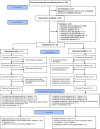A randomized pilot and feasibility trial of live and recorded music interventions for management of delirium symptoms in acute geriatric patients
- PMID: 40316916
- PMCID: PMC12048927
- DOI: 10.1186/s12877-025-05954-1
A randomized pilot and feasibility trial of live and recorded music interventions for management of delirium symptoms in acute geriatric patients
Abstract
Background: Delirium is an acute shift in attention and arousal, usually triggered by acute illness or surgery in older dementia patients. Prognosis is poor, and pharmacological options are limited; non-pharmacological interventions and music show promise.
Methods: This randomised pilot and feasibility trial tested feasibility, acceptability, fidelity, and safety of music interventions (MIs) for delirium patients and assessed preliminary effectiveness and suitability of the selected effect outcomes. Participants from an acute geriatric ward were randomised to Preferred Recorded Music (PRM) and Preferred Live Music (PLM), delivered for 30 min over three consecutive days. Feasibility outcomes included recruitment rate, retention, adherence, deviations, and treatment fidelity. Clinical outcomes were trajectory of delirium symptoms (arousal, attention, cognition), delirium duration, hospital stay length, and medication intake. Post-intervention and between groups changes in delirium symptoms were compared using mixed linear regression models for the repeated measurements. Mann-Whitney test and Fishers exact test were used for length of stay and medication use, respectively.
Results: 26 participants (PLM = 14; PRM = 12), median age 87, most with hypoactive delirium were recruited at a rate of three participants per month. Retention rates for PLM and PRM were 64% and 33% respectively and adherence to PLM and PRM intervention protocols were 83% and 58%, respectively. Total adherence to the assessment protocols was 44%. PLM was delivered as intended, (treatment fidelity 93%), and PRM did not satisfy treatment fidelity (83%). All delirium symptoms except arousal improved on day 3 compared to baseline, with statistically significant improvement in attention. No conclusive pre-post or between-group differences were detected for any outcomes; confidence intervals were wide.
Conclusions: Feasibility of recruitment, interventions and assessments was indicated, and greater acceptability, safety and fidelity of the PLM intervention compared with the PRM. Adoption of external assessors is warranted in future trials, to mitigate slow recruitment and low adherence. Wide confidence intervals for most measures and comparisons indicate that the possible effect of the MIs on delirium cannot be excluded. The trial was registered at Clinical Trials, ID: NCT05398211, on 31/05/2022.
Keywords: Covid-1; Delirium; Feasibility; Music; Music therapy; Severity.
© 2025. The Author(s).
Conflict of interest statement
Declarations. Ethics approval and consent to participate: Ethical approval was obtained from the Regional Ethics Committee in Norway (REK 457017). The ability to give informed consent was individually evaluated for each participant, and the consents were obtained by the experienced physicians, either directly from the patient, or supplemented or replaced by the consents from the legally assigned representatives (LAR) if the patient’s ability to consent was reduced. Three different consent forms informing of the study objectives personal data collection methods, benefits and potential risks, data management and the right to withdraw from the study were used. Consents in written format were prioritized, but verbal consents via phone-call were also approved by REK in cases where LAR were not physically present, and the written confirmation was acquired at the first possible occasion. Consent for publication: Not applicable. Competing interests: The authors declare no competing interests.
References
-
- American Psychiatric Association DS, American Psychiatric A. Diagnostic and statistical manual of mental disorders: DSM-5: American psychiatric association Washington, DC; 2013.
-
- León-Salas B, Trujillo-Martín MM, Martínez Del Castillo LP, García-García J, Pérez-Ros P, Rivas-Ruiz F, et al. Multicomponent Interventions for the Prevention of Delirium in Hospitalized Older People: A Meta-Analysis. J Am Geriatr Soc. 2020;68(12):2947–54. - PubMed
-
- Juliebø V, Bjøro K, Krogseth M, Skovlund E, Ranhoff AH, Wyller TB. Risk factors for preoperative and postoperative delirium in elderly patients with hip fracture. J Am Geriatr Soc. 2009;57(8):1354–61. - PubMed
Publication types
MeSH terms
Associated data
LinkOut - more resources
Full Text Sources
Medical


